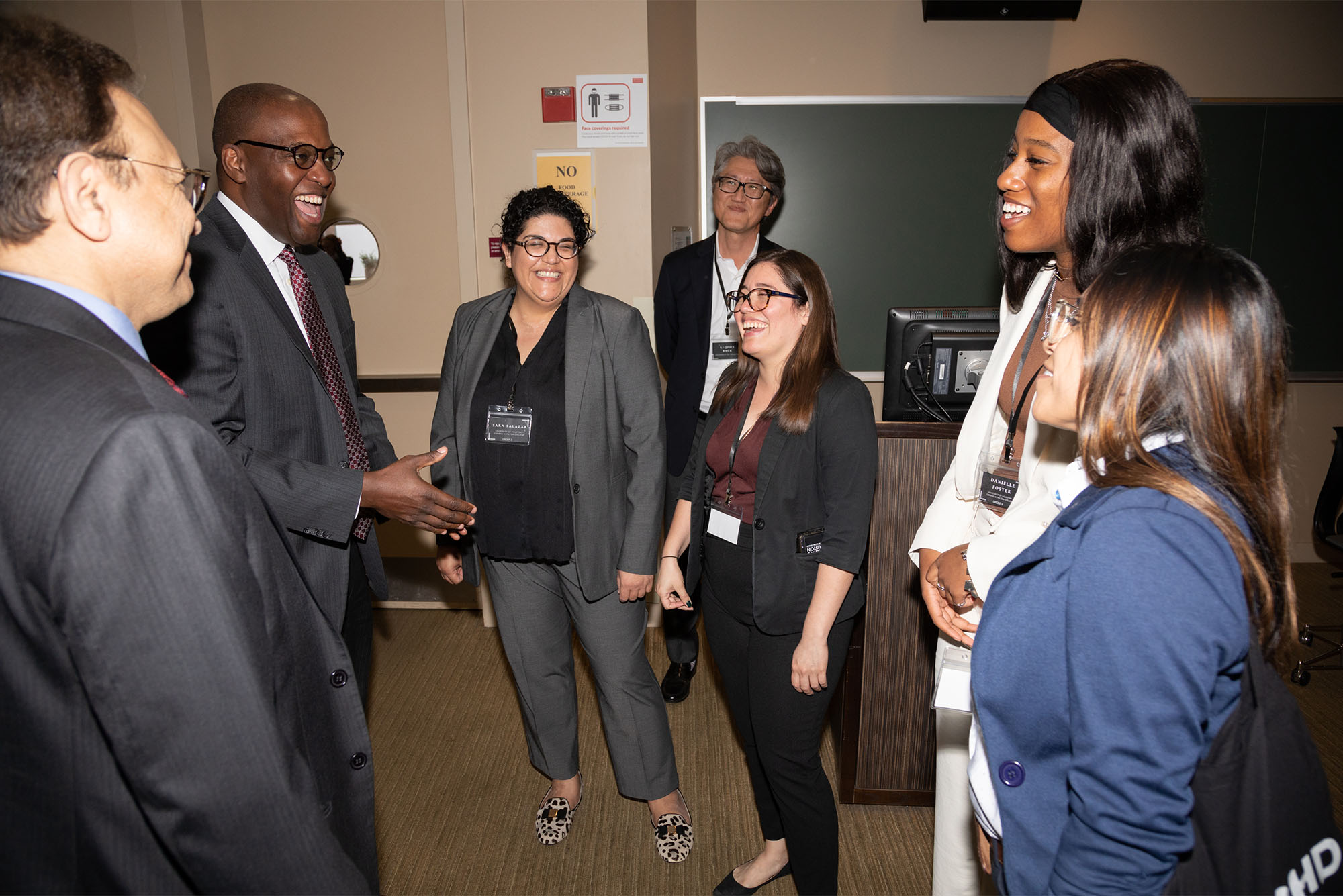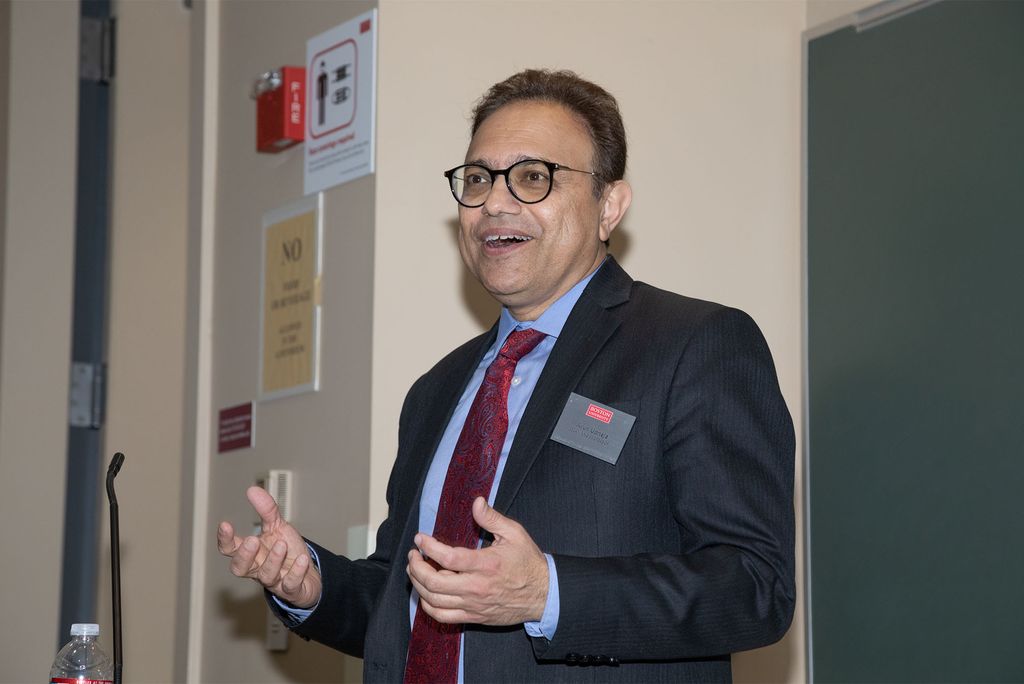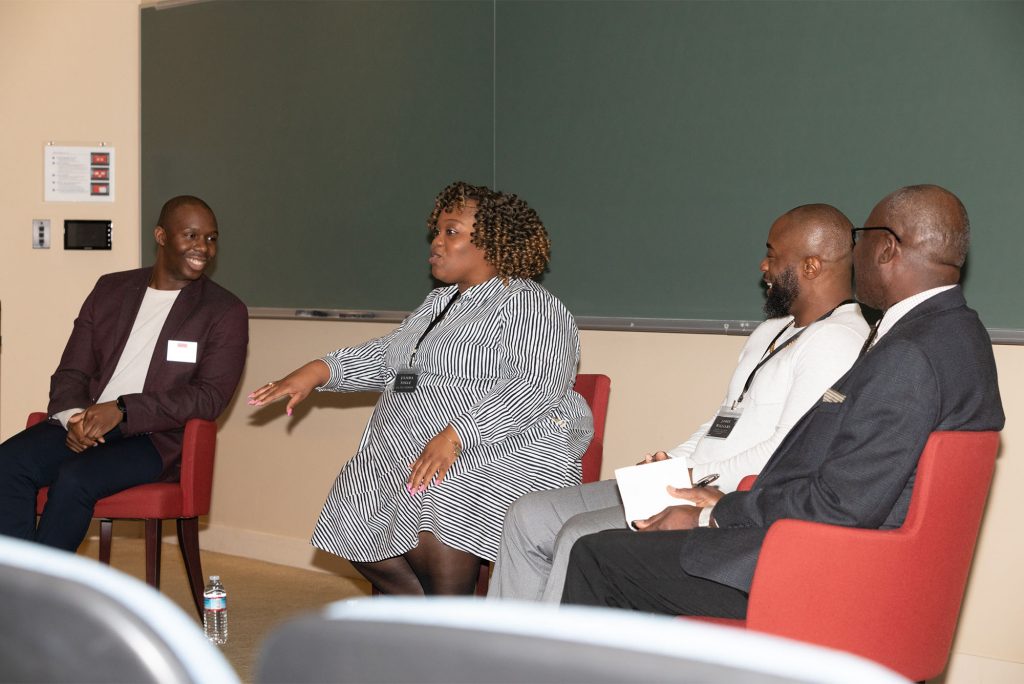School of Hospitality Administration’s PhD Pathway Conference Aims to Encourage Students of Color

Student attendees and hospitality faculty from across the country at the School of Hospitality Administration’s first in-person POC PhD Pathway Program in Hospitality and Tourism Conference on April 8.
School of Hospitality Administration’s PhD Pathway Conference Aims to Encourage Students of Color
Last weekend’s event part of an effort to increase diversity in hospitality faculty nationwide
According to a recent survey of hospitality programs in higher education, less than 10 percent of faculty across the country are people of color. Even more dire, a separate survey of hospitality PhD students revealed that on average, only one person of color graduates from the country’s 200-plus hospitality programs each year.
Those strikingly low numbers are what led Arun Upneja, dean of the School of Hospitality Administration, to launch the POC PhD Pathway Program in collaboration with hospitality deans and PhD directors from around the country two years ago. The program, which includes a mix of events, mentorship opportunities, and other accelerator initiatives, seeks to introduce high-achieving students of color to careers in academia.
One of the primary events? The POC PhD Pathway Program in Hospitality and Tourism Conference, which Upneja and SHA hosted in person for the first time April 8 and 9.
“It’s not that people of color are not joining PhD programs because they’re not interested in doctoral education or not getting into schools,” Upneja says. “The big reason is a lack of knowledge about what a career in academics entails. The teaching responsibility, research, compensation, career satisfaction—[the idea was] to cover all of these topics so that in two days, students get all of the information they need and all of their questions answered about starting a PhD program.”
The conference, organized by Upneja and colleagues Taylor Peyton, a SHA assistant professor, Marketa Kubickova from the University of South Carolina, Godwin-Charles Ogbeide from Purdue University, Deanne Williams-Bryant from Bethune-Cookman University, and professors from Pennsylvania State University and the University of Houston, drew 24 undergrad and graduate students from 13 universities, plus 15 deans, PhD directors, and professors from across the United States.

The conference kicked off on April 8 with opening remarks from Upneja and a keynote address from Raymond Bennett, Marriott International’s president of franchising for the US and Canada and a SHA Advisory Board member. A panel on academic life followed, featuring Richard Currie, a SHA assistant professor, alongside other hospitality professors and deans. The following day was reserved for one-on-ones and breakout rooms, where students gathered in small groups to learn about different aspects of a hospitality doctorate.
“Our goal over the next two days is to figure out how we can transform the hospitality industry and make sure there are role models for everyone who wants to pursue a career in academics,” Upneja said during his opening remarks.
The attendees underscored the importance of representation. Currie noted that many of the students attending said that the sole faculty member of color they’d had in their time at university was there at the conference. “I can absolutely understand how that lack of representation in higher ed would hold you back,” he said after the keynote speech, adding that he’d been the only Black male student in his PhD program at the University of Central Florida.
“Simply seeing other people having similar interests as you when those interests are rare and you don’t know what the next step is—this [conference] is so impactful and powerful for students to know that success [in hospitality and academics] is possible. And not only is it possible, but here are the resources you need to make it a reality. It’s so inspiring,” he said.
Recent SHA graduates Valerie Francois (SHA’21) and Paige Pasley (SHA’21), who each earned a master’s degree in hospitality management during the pandemic and started an events-planning company together, said that having a Black professor at SHA had been instrumental to their trajectories. “Someone earlier in the day talked about how you have to bring people up with you and to follow you,” Francois said during a break between events. “We wouldn’t have considered the PhD/academia route at all if it wasn’t for [Professor Currie] saying, ‘This could be happening for you and it is possible.’”

A PhD also doesn’t have to be intimidating, Upneja says. That’s why he and his colleagues started the Pathway Program—to make pursuing a doctorate feel as accessible as possible for everyone. “We’re trying to clear up all the fog,” he said, adding that students get scared by different aspects of doctoral studies.
“We’ve spent a year discussing all the different holdups. For some it’s the idea of research papers, for others it’s the idea of taking out more loans after grad school. Well, guess what? Over the course of a semester, we’ll learn how to break down research papers. And most universities provide you with an assistantship that charges you no tuition and offers you a living wage while getting your PhD.”
He also said that he and his colleagues want everyone to enjoy their professional lives as much as they have. In his decades-long career, Upneja has worked in hotel management as well as teaching and holding deanships at Penn State and BU. Getting the opportunity to help shape the futures of his students has been remarkable, he said.
“I don’t want to bash other careers, but the impact you have [on people] in this field is incredible. Last year, a student I taught 15 years ago at Penn State beamed into a class I was teaching to present to my students. He talked about the impact my class had on his career, and I couldn’t stop smiling to hear him and have him be there that day.
“Students come to college with hopes and dreams, aspirations—my job is to give them a platform so that they can achieve them,” Upneja said.
“That is so gratifying.”
Comments & Discussion
Boston University moderates comments to facilitate an informed, substantive, civil conversation. Abusive, profane, self-promotional, misleading, incoherent or off-topic comments will be rejected. Moderators are staffed during regular business hours (EST) and can only accept comments written in English. Statistics or facts must include a citation or a link to the citation.